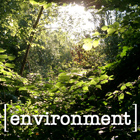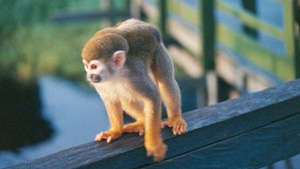
|
|||||||||||||||||||
|
22 February 2006 :: Lainey Johr Brazil is home to one-third of the world's monkey species, making the nation one of the richest in primate genetic diversity. The survival and prevalence of monkeys in Brazil stands against the country’s demand for more arable land to feed and house an ever-growing population. This makes the monkeys’ survival an important measure of the effect of human beings on the natural environment. Their ability to thrive in the midst of human developments and encroachment into their natural habitat is key to interpreting the health of the local and broader ecosystems. Two new monkey species were found in the Amazon in 2002 —a breath of fresh air for scientists and naturalists who lament dwindling numbers in the monkey population. Unfortunately, more species are threatened with extinction than are discovered, leaving the monkey population in a poor state. 13 out of the 24 new monkey species found worldwide since 1990 have been found in Brazil. Not all of them have been found in the Amazon, but in the Atlantic Forest, on the east coast of the country. Once a dense, thick forest, the Atlantic is now roughly 10% of its original size due to the region housing three-quarters of Brazil’s vast human population of 186 million. Although much smaller than the Amazon, its diversity in plant and animal species is just as robust. 21 primate species in the Atlantic Forest are found nowhere else in the world. The Amazon is an area of intense biological diversity, with more plant species in two and a half acres than are found on the entire Atlantic coast of the US. It is proven that diversity is healthy, because genetic variety allows for greater adaptability and long-term resilience of a population. If the evidence shows that monkey populations are getting smaller, the likelihood is that other species of plants and animals are too, and that the fabric of the surrounding ecosystem is deteriorating. The felling of Amazon forestlands ultimately spells a decrease in plant and animal species and a loss of precious biodiversity that may never be restored. An astounding 5.4 million acres of forests are cleared every year in Brazil. On a global scale, it is estimated that 157 species of life become extinct every year, not counting species that are yet unknown to scientists. The loss of habitat and the decrease in monkey populations in the Amazon is a sign of the times. Human development and expansion into the Amazon is overwhelming the forest’s ability to recuperate and to sustain the intense diversity of life within it. Some scientists believe ‘virgin forests’ can be rejuvenated over time and can recover from human interference. But according to researchers from Oxford University, history shows otherwise. They suggest that density of forestland should not become confused with ‘virginity’ of forestland, and that there is significant evidence that current forests have not yet recovered from humanity’s imprint thousands of years ago. This suggests that a rainforest’s mechanisms for surviving the current trend of extreme forest-clearage are not so elastic as once believed. Collapse of the diverse, oxygen-producing Amazon ecosystem could alter global climate patterns and impact rainfall, soil fertility, and sustainability of harvests and natural resources. So the condition of Brazil’s numerous monkey species represents ecological factors which could have far-reaching global implications. Their well-being and the sustainability of their habitat serves as a measure of the future health and resiliency of natural systems that support human life and civilization. [s]
|
||||||||||||||||||
|
|||||||||||||||||||







